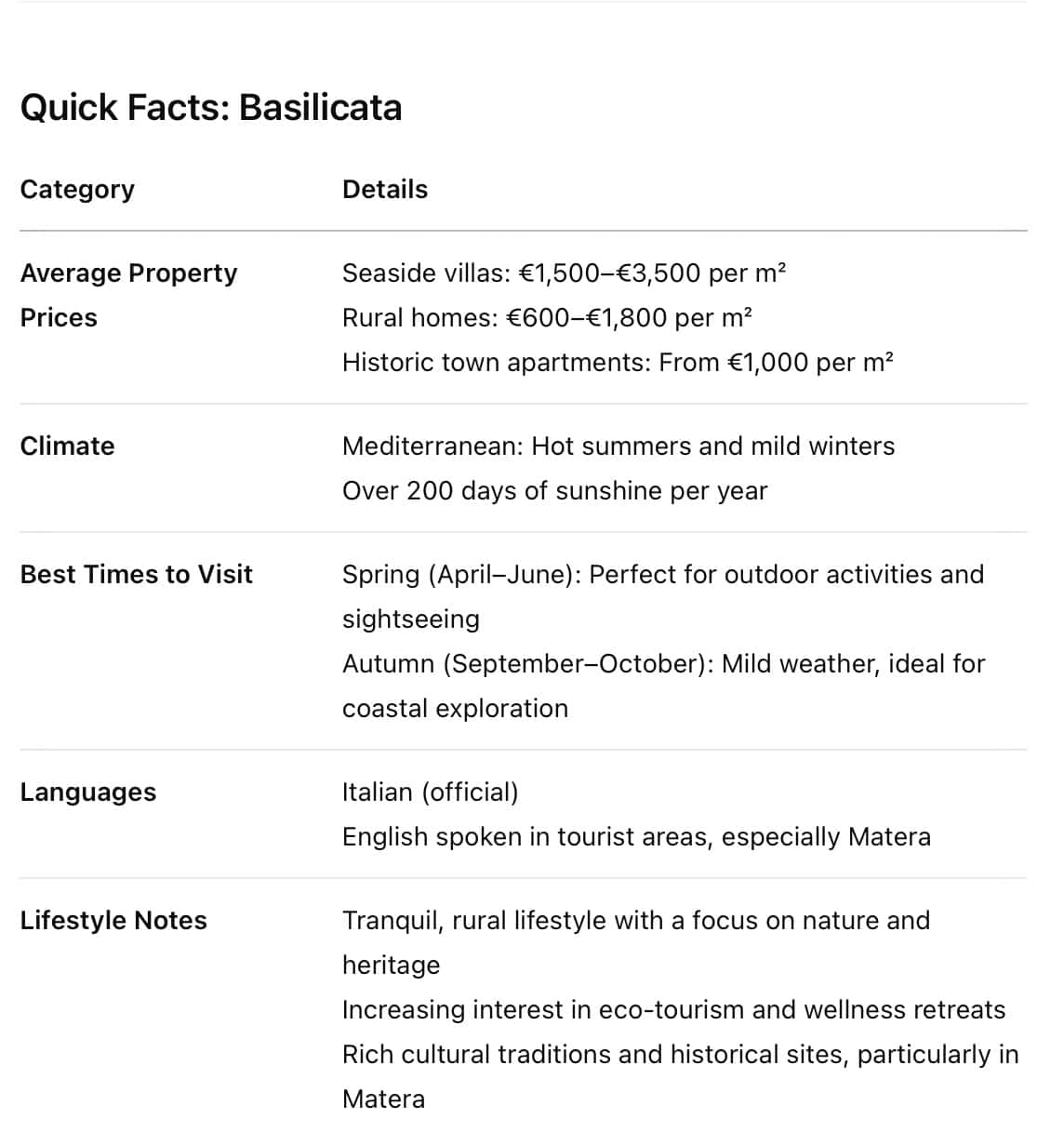Buying Property in Basilicata
Basilicata truly dazzles with its dramatic landscapes, rich culture, and fascinating history. Consequently, buying property in Basilicata offers buyers a unique blend of natural beauty, historic charm, and remarkable real estate value. Whether you dream of a peaceful seaside escape, a charming rustic farmhouse, or a stylish apartment in a timeless town, Basilicata undoubtedly has something for everyone.
In this guide, we walk you through the buying process, spotlight key risks to avoid, and explain why working with a specialist real estate attorney is crucial for a smooth and secure transaction.

Step 1: Understand the Market Before Buying Property in Basilicata
Basilicata is divided into two provinces:
– Potenza – A lively mix of medieval towns, dramatic mountains, and authentic southern living
– Matera – UNESCO World Heritage fame with ancient cave dwellings and elegant piazzas
The region is served by several convenient airports, including:
– Bari Airport (BRI) – A short drive to Matera
– Naples Airport (NAP) – Offering access to western Basilicata
– Brindisi Airport (BDS) – Ideal for southern adventures
Before making a move, ask yourself:
– Will the property serve as a vacation home, retirement haven, or investment?
– Are you aiming for a turnkey home or an exciting renovation project?
– How important are proximity to airports, hospitals, and cultural sites to you?
Because many properties here are historic or rural, early legal due diligence becomes absolutely essential to avoid future headaches.
Step 2: Work with Trusted Professionals When Buying Property in Basilicata
Building the right team around you is the first step toward a successful purchase.
Choosing a Real Estate Agent:
Select agents who:
– Are registered with the local Camera di Commercio
– Hold a valid agente immobiliare abilitato license
– Offer transparent commissions and clear contracts
– Collaborate openly with your attorney
– Communicate effectively in your preferred language
Above all, a good agent facilitates your journey rather than simply chasing a sale.
Why Hiring a Specialist Real Estate Attorney Is Critical:
Basilicata’s real estate transactions involve regional nuances and specific legal risks. A specialist attorney:
– Represents only your interests
– Manages full due diligence
– Shields you from hidden liabilities
Importantly, choose your own lawyer rather than accepting one recommended by an agent or seller. While such offers may seem convenient, they often present conflicts of interest. Your independent attorney will provide objective advice, full transparency, and robust protection.
Step 3: Legal Due Diligence When Buying Property in Basilicata
Skipping or rushing legal checks is a major risk you should avoid at all costs.
Your attorney will:
– Verify clear property title
– Ensure no hidden debts, mortgages, or easements
– Confirm accurate land registry entries
– Check for necessary building permits and zoning compliance
– Review historic preservation restrictions, particularly in Matera’s ancient districts
Real Pitfalls to Watch For:
One buyer, unfortunately, unknowingly purchased a farmhouse that was partly built on public land, which, as a result, limited their development options. Similarly, another buyer purchased an apartment in Matera, only to later discover, much to their dismay, that strict renovation limits were in place due to heritage protections. Meanwhile, a coastal buyer was surprised to find that their dream home came with unpaid taxes, which were tied to previous owners.
Clearly, solid legal checks are not optional – they are your safety net.
Step 4: Make a Reservation Offer – “Proposta di Acquisto”
After preliminary checks, your attorney will help you draft a reservation offer outlining:
– Your intended price
– Conditions subject to due diligence
– Timeframes for contract signing
A modest deposit secures the agreement. Upon seller acceptance, the offer becomes legally binding.
Step 5: Sign the Preliminary Contract (Compromesso)
The compromesso specifies all key sale conditions, such as:
– A detailed property description
– Final purchase price
– Payment deadlines
– Penalties for withdrawal
Typically, you will pay a 10–20% deposit at this point.
If you withdraw without a valid reason, you lose the deposit. Conversely, if the seller defaults, you are entitled to double the deposit amount.
Thus, precise legal drafting at this stage is essential to fully protect your interests.
Step 6: Final Signing – The Notary’s Role When Buying Property in Basilicata
Finally, the transaction concludes with the rogito — the deed of sale signed before a notary (notaio).
The notary’s role includes:
– Verifying the legality of the sale
– Ensuring all taxes are correctly paid
– Registering your new ownership
Keep in mind, though, that notaries remain impartial and do not offer legal advice. Only your attorney can safeguard your individual rights during this critical stage.
Moreover, if you do not speak fluent Italian, a certified translator must assist during the deed signing. Hiring a bilingual attorney from the start will simplify communication and ensure clarity throughout.
Finally…
At De Tullio Law Firm, we specialize in helping international buyers safely and confidently purchase property in Basilicata. Our decades of local experience, bilingual expertise, and tailored legal support ensure that your dream becomes a reality without unnecessary stress.
Whether you’re looking to invest in a charming Matera apartment or restore a countryside estate with sweeping mountain views, we are here to guide you at every step.
Ready to explore property opportunities in Basilicata? Contact us today for a free preliminary consultation.



